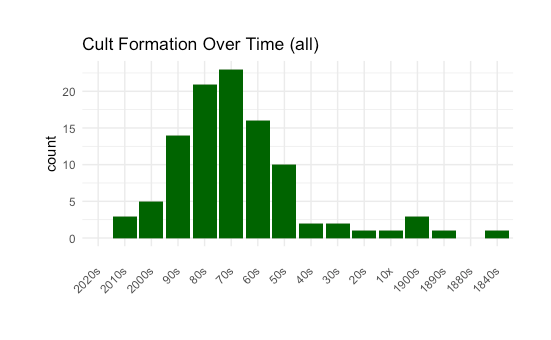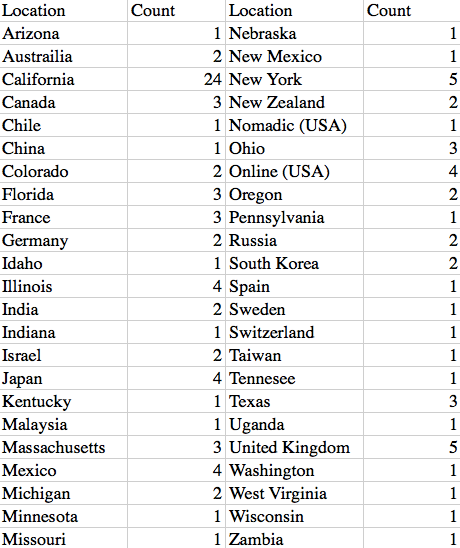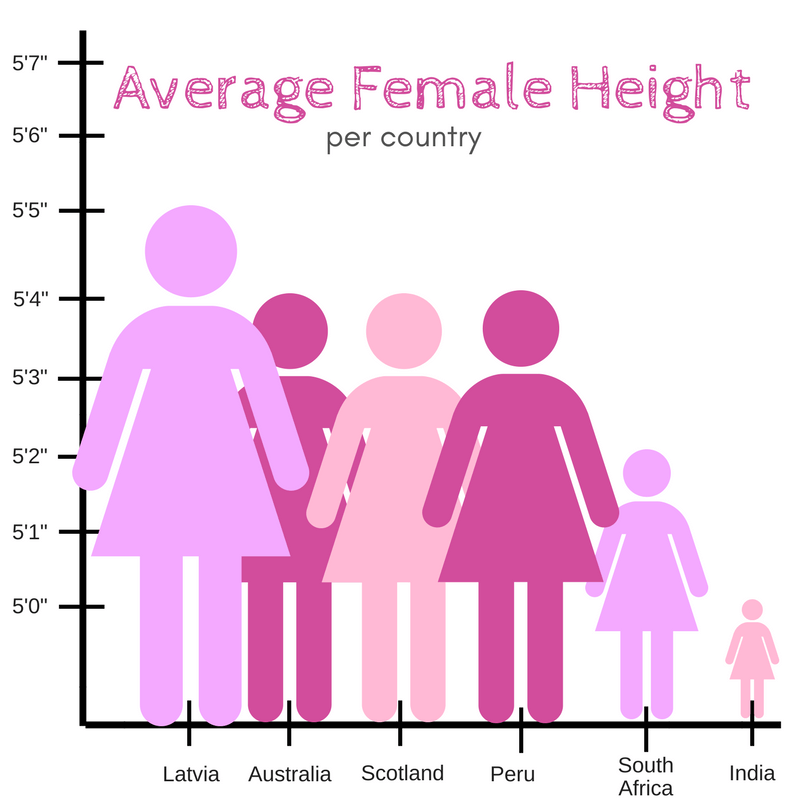Links For June
...
[Remember, I haven’t independently verified each link. On average, commenters will end up spotting evidence that around two or three of the links in each links post are wrong or misleading. I correct these as I see them, and will highlight important corrections later, but I can’t guarantee I will have caught them all by the time you read this.]
1: Zoologists search for the Higgs Bison
2: “The cult deficit” is the theory that we don’t have as many cults as we used to and this says something important about our society. Here’s some data, courtesy of the Secretum Secretorum Substack:
Also confirming what everyone secretly already knows - number of cults in the dataset by country/US state:
Also interesting, from the same blog: The Myth Of The Myth Of The Lone Genius
3: The Obesity Wars: A Personal Account. A CDC researcher accuses Harvard School of Public Health of launching a campaign to harass and discredit her after publishing a paper showing overweight wasn’t as dangerous as previously thought. Probably my favorite of this month’s links for the “how the sausage gets made” perspective, though the writer is hardly an unbiased source.
4:
Related: this study finds that there’s only a correlation of 0.2 between different reviewers’ ratings of social science grant proposals - I wonder what this is like in other fields.
5: SSC’s former sparring partner Mencius Moldbug seems to be doing well, with Fox News’ Ben Domenech adopting his term “Cathedral” for the progressive establishment (see full video here)
Domenech says he got the term from Michael Malice, who’s done podcasts with Moldbug, so no mystery here - it’s just weird to see on mainstream TV.
6: No Causal Associations Between Family Income And Subsequent Psychiatric Disorders, Substance Misuse, And Violent Crime Arrests: A Nationwide Finnish Study Of >650,000 Individuals And Their Siblings. This study finds that without adjusting for confounders, it looks like poverty causes negative life outcomes (eg psych disorders, drug abuse, and arrests) - each extra $15,000 your family has lowers your risk of these things by 9%. After adjusting for the usual set of measurable confounders, that decreased to 4.5%, and after using a novel sibling-based method to adjust for confounders, the effect completely disappeared. If true, this would mean that growing up poor doesn’t cause these negative outcomes and is just correlated with them (eg parents with genes for drug abuse are poorer than average, maybe because they’ve been abusing drugs, so their kids grow up poor and then also abuse drugs). My main concern is that I don’t entirely understand their sibling-based adjustment. My impression is that they looked at siblings raised at different times in a family’s financial history (eg you grow up when your family is poor, but your sibling grows up later after your family has become rich). But most siblings are pretty close together and most families don’t have their incomes swing too wildly, so this would require a lot of assumptions about when the “critical period” at which income affects children is, which I don’t really see laid out explicitly. I wonder if it also assumes that factors adjust very quickly (eg if your parents get a better job and start making more money, they might not immediately move to a better house, and if living in a better house is what prevents negative life outcomes, this wouldn’t show up). Also, standard disclaimer that this was done in Scandinavia where poverty works differently.
Related: genes associated with income are probably causal, since siblings with more of them do in fact earn more money than siblings with fewer of them. And here’s a FAQ about the study by the coauthors.
7:
8: Skepticism about claims that having pets makes people healthier.
9: Upset that the Atlanta Braves unfairly stereotype Native Americans? Apparently Atlanta is an equal opportunity offensive-sports-team-haver: their team used to be called the Atlanta Crackers (and their Negro League team was the Atlanta Black Crackers!)
10: I’d previously been pretty sure that visual imagination was just about engaging the visual cortex in the absence of a stimulus, but here’s a study using research on stroke patients and MRI images to argue that it’s probably based in the temporal lobe.
11: Claim: Paul Krugman’s infamous prediction about the Internet having the same scale of effect as the fax machine was right in the context it was made:
(edit: possibly not true, see this comment)
12: United Airlines agrees to purchase 15 supersonic passenger jets from aerospace start-up Boom, which expects them to be ready in 2029.
13: Claim: very high support (80% of Americans) for requiring ID to vote; non-whites more likely to support ID requirements than whites are.
14:
More here. Also from the world of pretty great anti-US Chinese cartoons (h/t Steve Hsu):
Still trying to figure out who the black bird and the frog are supposed to be, or why Australia seems to have replaced Germany in the G7.
15: Related: in case you wondered what would make the oppressed people of China rise up in revolt, apparently it’s having their colleges merged with vocational schools in a way that dilutes the value of their degrees.
16: Theory on why Waymo hasn’t established its driverless car program yet. TL;DR: they’ve solved driving in very easy cities like Chandler, Arizona, but all the profitable markets are in very hard cities, so they’re going to try to master hard cities before going public at all.
17: Claim: counties where the seminal pro-KKK movie Birth Of A Nation was played on its five year “tour” had more lynchings and race riots after the showing. Somewhat less believable claim: counties where it played still have more hate crimes today. I bet this turns out to be one of those persistence studies that doesn’t replicate.
18: From Language Log, self-explanatory:
…except that some of the article’s earlier claims about “what normal people don’t notice in language” seem really wrong to me. Normal people don’t notice that truth is just true+th, or depth is deep+th, or that horror is related to horrify? I had never even considered the possibility that people might not notice these things. Is the Language Log author crazy, or am I?
19: I’ve really been appreciating Glenn Greenwald lately. I think of myself as a pretty informed news consumer, but as the Garfield meme says, I am not immune to propaganda, and Greenwald has been doing a great job telling me which of the things I believed aren’t true. For example, the story that the police violently cleared a park in front of a DC church last year so Trump could do a photo op there was false (edit: see here for some debate). And apparently there was no link between the Pulse gay nightclub shooting and anti-LGBT hate - it was just an Islamic terrorist randomly choosing a place to shoot up to make his geopolitical point. Weird.
20: Three Point Shooting In The NBA And Meritocracy. Ignore “meritocracy” in the title - you have to claim to be critiquing meritocracy to get clicks these days, but it’s actually about the Efficient Market Hypothesis. The article claims that NBA teams systematically took many fewer than optimal three-point shots for thirty years, and have only recently realized that taking many more is a better strategy.
21: Claim: despite its pro-sex-worker image, Sweden actually persecutes sex workers plenty, they just find stupider ways to do it. EG if you (a sex worker) pay half the rent for your two-person apartment, they can arrest your roommate for “profiting from sex work”. Or they can arrest your landlord for the same (which means landlords won’t rent to anyone they know is a sex worker).
22: David Graeber claimed that between 20% and 50% of workers are in “bullshit jobs” with no social value. But in research intended to test the claim, only about 5% of workers felt this way about their position. And contra Graeber’s claim that this is increasing over time, the percent of people who self-identify this way has fallen substantially over the past decade. Also, the jobs where people admit to this are the opposite of the ones Graeber pointed to. Obvious self-report bias is obvious.
23: Last year, Rutgers Law School instituted a requirement that all student clubs that they must hold at least one event promoting critical race theory or related topics, or else lose most of their funding. After pressure from FIRE, a pro-free-speech-in-education advocacy group, they now appear to have backed down.
24: Related: In addition to all the usual reasons, studies with unwoke conclusions are now being removed from journals because people make “serious and credible threats of personal violence” against the editors of journal editors who keep them up.
25: Related: when surveyed privately, most Saudi men support women working outside the home. But in public they oppose it because they think everyone else opposes it and don’t want to get in trouble! Relevant Scott Aaronson lecture and SSC story.
26: Contra every evolutionary psychologist ever, there is no evidence of nutritional benefit for being or marrying a well-reputed Hadza hunter , probably because everyone shares food communally anyway. Usual disclaimer that not all hunter-gatherer groups are the same, modern hunter-gatherers are unrepresentative of ancient ones, etc.
27:
28: Related: Ultra-Orthodox trans women. How do you like that free will now?
29: A California bill that would decriminalize psychedelics (and make them legal for doctors to prescribe!) has passed the state Senate, but still has to pass the Assembly before becoming law. Also, it was sponsored by Scott Weiner, who’s also responsible for YIMBY legislation and a bunch of other things. Is there some story behind why California has 120 legislators but every interesting proposal I hear about is sponsored by the same guy?
30: Does Critical Flicker-Fusion Frequency Track The Subjective Experience Of Time? Okay, this is a really weird one, but bear with me. We can imagine experiencing time at a different subjective rate - for example, stories of people who feel like they lived an entire decades-long alternative life in a dream, then wake up to find that only a single night has passed. How do we know that other people (or other animals species) are experiencing time at the same rate we are? One possibility is to track what’s called critical flicker fusion frequency - how close together do two flashes of light have to be before they appear as a single flash? Turns out animals differ a lot in this! Toads have a CFF of about 10% of humans, and so might experience the world in fast-forward; bees have a CFF about 3x humans, so might see the world in slow-motion. This potentially has ethical implications; if we measure utility in days or years of happiness or suffering, should we be multiplying by these numbers to get subjective experience? See the link for much more than you wanted to know about this.
31: From Skeptics StackExchange: contra inflated claims, playing grandmaster-level chess doesn’t burn as many calories as running. I’m actually surprised these numbers are as high as they are; I’d previously thought the brain burned a pretty constant amount of calories regardless of how much cognitive load it was under, but these figures seem well above resting metabolic rate.
32: Why did we stop having ticker tape parades? (metaphorically and literally)
33: A common polyamory talking point is “you wouldn’t be jealous if your friend had other friends”. Now psychologists find that people definitely get jealous if their friends get other friends.
34: A study finds that higher testosterone makes people more willing to consider minority positions. Are you man enough to believe it?
35: Claim: Sci-Hub needs your help
36: I was linked to this Telegraph article after being told it was relevant to my post discussing conflicts between race-based and feminism-based social justice, and it does not disappoint: “In the wake of sex scandals that have rocked the charity, Oxfam has produced guidance which states that: 'Mainstream feminism centres on privileged white women and demands that 'bad men' be fired or imprisoned.' Accompanied by a cartoon of a crying white woman, it adds that this 'legitimises criminal punishment, harming black and other marginalised people.'”
37: Resolutions Of Mathematical Conjectures Over Time. “In 2014, we found conjectures referenced on Wikipedia, and recorded the dates that they were proposed and resolved, if they were resolved. We updated this list of conjectures in 2020, marking any whose status had changed. We then used a Kaplan-Meier estimator to approximate the survivorship function…The data is fit closely by an exponential function with a half-life of 117 years.”
38: Porn site xHamster surveys 15,000 viewers to learn about the intersection between politics, sex, and porn. Again, the headlines write themselves:
Much more at the link.
39: Extremely ambitious study aims to show that the FDA placing an extra warning on antidepressants in 2009 decreased US labor force participation 0.2 percentage points, presumably because it scared people away from taking antidepressants and then people got more depressed and couldn’t work as much. I call BS despite apparently high significance levels: partly on priors, partly because there was too much leeway to cherry-pick when the warning started mattering, and partly because the effect was only in older women even though the FDA’s warning only applied to adolescents.
40: The cutest cognitive bias: people overestimate their own IQ by 30 points (!), but overestimate their romantic partner’s IQ by 40. The same study also claims there’s no correlation between “intellectual compatibility” and relationship satisfaction within relationships; ie you’re not more likely to have a happy relationship if your partner has a similar IQ to you (but see comment here).
41: The tendency for Supreme Court Justices to move left over time is known as the Greenhouse Effect, after former New York Times legal correspondent Linda Greenhouse.
42: The worst infographic ever? (source)













